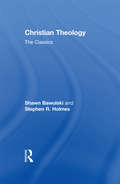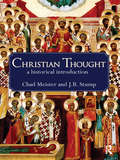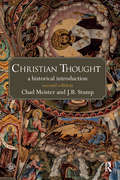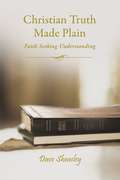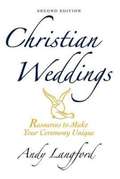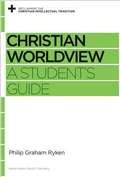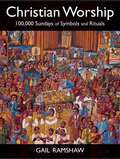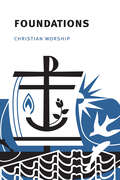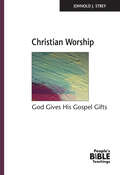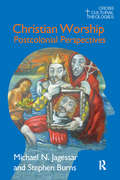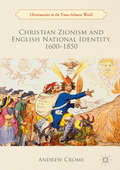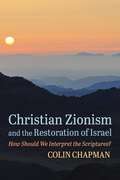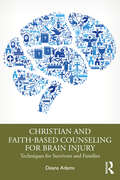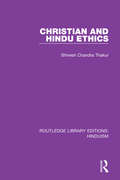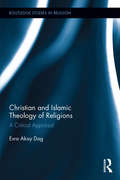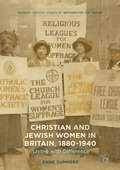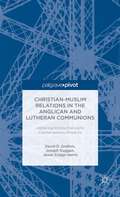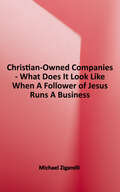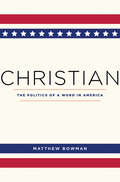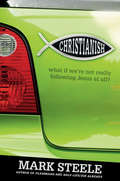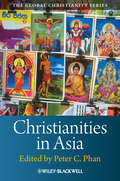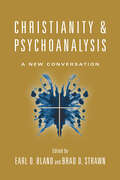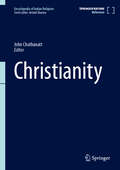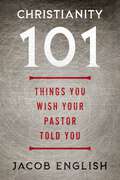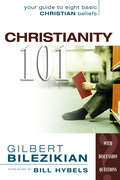- Table View
- List View
Christian Theology: The Classics
by Stephen Holmes Shawn BawulskiChristian Theology: The Classics is a vibrant introduction to the most important works of theology in the history of Christian thought. Exploring writings from the origins of Christianity to the present day, it examines some of the most influential theologians of all time, considering the context in which they were writing and the lasting significance of their work. Covering thirty-one theological classics such as: • Augustine of Hippo, On the Trinity • Martin Luther, Commentary on Galatians • John Calvin, The Institutes of The Christian Religion • Jonathan Edwards, Religious Affections • St Thomas Aquinas, Summa Theologiae With a glossary and outlines of the key criticisms of each text, this book is the perfect starting point for anyone interested in Theology and the history of Christian thought.
Christian Thought: A Historical Introduction
by Chad Meister James StumpThe story of Christian thought is essential to understanding Christian faith today and the last two millennia of world history. This fresh and lively introduction explores the central ideas, persons, events, and movements that gave rise to Christian thought, from early beginnings to its present forms. By highlighting the important but often neglected role of women and the influence of non-Christian ideas and movements, this book provides a broader context for understanding the history of Christian ideas and their role in shaping our world. This work chronicles the impressive developments of Christian thinking which arose from these contexts and have transcended the ages. Christian Thought: provides an overview of the context of Christianity’s origin, including discussion of the influence of Hebrews, Greeks, and Romans in the ancient world and the founding figures of Jesus and Paul explores the major events and figures of the history of Christian thought, while drawing attention to significant voices which have often been suppressed analyses the impact on Christian thought of widely discussed events such as The Great Schism, the Scientific Revolution, and Modernism surveys contemporary trends such as fundamentalism, feminism, and postmodernism. Complete with illustrations, timelines and maps, this is an ideal resource for anyone wanting to learn more about the development of Christian thought and its influence over the centuries.
Christian Thought: A Historical Introduction
by Chad Meister James StumpThe story of Christian thought is essential to understanding Christian faith today and the last two millennia of world history. This fresh and lively introduction explores the central ideas, persons, events, and movements that gave rise to Christian thought, from early beginnings to its present forms. By highlighting the important but often neglected role of women and the influence of non-Christian ideas and movements, this book provides a broader context for understanding the history of Christian ideas and their role in shaping our world. Christian Thought: provides an overview of the context of Christianity’s origin, including discussion of the influence of Hebrews, Greeks, and Romans explores the major events and figures of the history of Christian thought, while drawing attention to significant voices which have often been suppressed analyses the impact on Christian thought of widely discussed events such as The Great Schism, the Scientific Revolution, and modernism surveys contemporary trends such as fundamentalism, feminism, and postmodernism. This fully revised and updated second edition features a new chapter on liberal theology and reflects recent scholarship in the field. Complete with figures, timelines and maps, this is an ideal resource for anyone wanting to learn more about the development of Christian thought and its influence over the centuries. Further teaching and learning resources are available on the companion website at www.routledge.com/cw/meister.
Christian Truth Made Plain: Faith Seeking Understanding
by Dave SheasleyThe book provides a clear and straightforward presentation of Christian truth for the average Christian believer in understandable, non-ecclesiastical, language. It is intended to help the believer understand the ultimate truth about God and human beings and, with the knowledge of such truth, experience the peace, comfort, and assurance of God's love and purpose.God has made Himself known through the magnificence of the natural world and astounding complexity of life itself. Today we also know that the universe was created in the Big Bang, which requires a Creator who exists outside the universe.Although believers know that God is omnipotent, omniscient, and omnipresent, an indispensable part of God's true nature is his love. This is demonstrated through God's ultimate revelation in Jesus Christ. It is his love of human beings and his desire for a love relationship with us that is his reason for creating us and our purpose for being.But sin entered the world with Adam's disobedience in the Garden of Eden. The true nature of sin is understood as self-centeredness, a misplaced priority of putting our own needs and wants above those of the One who created us. Adam's original sin resulted in a genetic change that has been inherited by all human beings born after Adam, and accounts for the sin nature of self-centeredness that exists within each one of us. It is this original sin which accounts for all the pain and suffering, even from natural disasters and disease.God's act to remedy human sin and restore our relationship with Him is Jesus Christ. The Bible describes our condition and his solution using legal terms such as guilt and punishment, as a debt which we owe to God but cannot repay, and as slavery to our sinful nature. We are unable to do anything ourselves to remedy our condition. Salvation is a gift which God offers us. All we have to do is believe the truth.In the second part of the book, various troublesome topics that confront the Christian believer are discussed in order to bring understanding, comfort, and assurance. God's existence outside of time is presented to correct the misunderstandings of predestination. The truth of God's grace, the free gift He offers through Jesus Christ, is explained, showing that a gift offered must be accepted in order to be complete.The contemporary issue of evolution is shown to be wholly consistent with Christian truth when the established scientific facts and Christian truth are both understood. God's hand, rather than chance, explains the development of new species through genetic changes in DNA, while human beings came into existence through the image of God which He miraculously breathed into Adam and Eve in a second step following the physical and physiological development of the bodies which we inhabit.Insights are provided into the usually avoided topics of Jesus Christ as the only way to God and the seeming mystery of death.
Christian Weddings, Second Edition: Resources to Make Your Ceremony Unique
by Andy LangfordSince its publication, Christian Weddings has become the necessary tool for engaged couples and pastors to plan unique and meaningful wedding services. It allows users to select the different elements from their wedding liturgy from a menu of choices in ceremonies from over twenty denominational traditions around the world. Christian Weddings serves many purposes. Pastors can offer new options in planning Christian weddings; couples of mixed religious denominations or traditions can celebrate a wedding day that meets their Christian needs; and couples who want a special service can successfully create a beautiful, personalized ceremony. This new edition includes additional ceremonies from an expanded range of sources, giving couples even greater freedom to plan a ceremony that fits their needs.
Christian Worldview: A Student's Guide
by Philip Graham RykenOur worldview shapes everything about us. In this student's guide, Ryken explains the Christian worldview, from the existence of God to the nature of sin and redemption. Part of the Reclaiming the Christian Intellectual Tradition series.
Christian Worship: 100,000 Sundays of Symbols and Rituals
by Gail RamshawThis unique textbook not only lays out the religious-studies framework of a contemporary understanding of worship, it also offers a full history of Christian worship in each historical period, including the American experience. In light of this history of experiences, Ramshaw finally addresses ongoing issues in our understanding of Christian Worship (gender, authority, ethics, skepticism) and places them into an explicitly cross-religious framework with Islam, Judaism, and other religions.
Christian Worship: Foundations
by Northwestern Publishing House The Hymnal Committee for Christian WorshipHow do you worship? Christians in many different churches worship God in many different ways. Why do you worship the way you do? Pastors and worship leaders must ask and answer questions about worship as they prepare to lead their congregations and share the means of grace in Word and sacrament with God's people. Christian Worship: Foundations offers a helpful and practical commentary on various parts of the church service that will inform decisions for those leading worship. While written with pastors in mind, this resource is valuable for all Christians interested in the fundamentals of worship. The book explores a wide variety of worship topics, including the history of worship in the Christian church at large, the church year, various rites and services, various roles in worship, art and music choices, the culture of worship, and outreach. This book is meant to help you grow in your understanding of Christian worship principles and practices."
Christian Worship: God Gives His Gospel Gifts (People's Bible Teachings)
by Johnold J StreyHow do Christians worship?Different religions in the world have different customs and practices for worship services. If you’re wondering about worship practices or if you’re interested in learning more about how Christians worship, this book is for you!Christian Worship explores Christian worship practices and the biblical principles that guide them. In this book, pastor and author Johnold J. Strey uses the wisdom of God’s Word to explain the guidelines for worship, the significance of each part of the church service, the church year, what symbolism is, and more!Once you read this book, you’ll never look at your weekly worship service the same way again!The People’s Bible Teachings is a series of books on all the main teachings of the Bible. Following the pattern set by The People’s Bible series, these books are written for all Christians in an easy-to-read manner. The authors of The People’s Bible are all pastors and professors who have had years of experience teaching others about the Bible.
Christian Worship: Postcolonial Perspectives (Cross Cultural Theologies Ser.)
by Stephen Burns Michael N. JagessarPostcolonialism has greatly influenced biblical and theological criticism but has not yet entered the realm of church worship and practice. 'Christian Worship' brings the insights of postcolonial thinking to the rituals of religious life. The book critically analyses liturgical theology through the lens of postcolonialism and explores the challenges of appropriating postcolonial perspectives in Christian worship. Ranging from liturgical texts and song to Scripture, lectionaries, festivals and sacraments, this volume offers a fresh approach to liturgy that will be of interest to students of theology, seminarians and church practitioners.
Christian Zionism and English National Identity, 1600–1850 (Christianities in the Trans-Atlantic World)
by Andrew CromeThis book explores why English Christians, from the early modern period onwards, believed that their nation had a special mission to restore the Jews to Palestine. It examines English support for Jewish restoration from the Whitehall Conference in 1655 through to public debates on the Jerusalem Bishopric in 1841. Rather than claiming to replace Israel as God’s “elect nation”, England was “chosen” to have a special, but inferior, relationship with the Jews. Believing that God “blessed those who bless” the Jewish people, this national role allowed England to atone for ill-treatment of Jews, read the confusing pathways of providence, and guarantee the nation’s survival until Christ’s return. This book analyses this mode of national identity construction and its implications for understanding Christian views of Jews, the self, and “the other”. It offers a new understanding of national election, and of the relationship between apocalyptic prophecy and political action.
Christian Zionism and the Restoration of Israel: How Should We Interpret the Scriptures?
by Colin ChapmanHow should Christians today understand the many promises and prophecies in the Old Testament about the future of Israel and its land? Are Christian Zionists justified in believing that these have been fulfilled in the return of Jews to their land since the 1880s and the creation of the State of Israel in 1948? This book discusses all the key texts about the restoration of Israel that are quoted in these debates, questioning the Christian Zionist interpretation and offering an alternative. This is followed by a detailed study of two important Old Testament texts dealing with the future of Israel, Ezekiel 33-47 and Zechariah 9-13, understanding them in their original context and exploring how they are interpreted in the New Testament. This is no theoretical, ivory-tower debate. We are dealing here with the most bitter and protracted conflict of the last 150 years; and the way we interpret the Bible has profound political consequences.
Christian and Faith-based Counseling for Brain Injury: Techniques for Survivors and Families
by Deana AdamsChristian and Faith-based Counseling for Brain Injury is the first book of its kind to offer faith-based therapy to address the emotional, cognitive, and mental health needs of individuals who have suffered a traumatic brain injury (TBI). A highly researched piece of work, the book puts forth an innovative and effective method for not only addressing the challenges of a life-changing injury but also for creating a sense of purpose. Through the nuances of faith-based counselling, this book focuses on the spiritual and existential aspects of understanding the diagnosis and creating a purpose post-injury. It examines how brain injury can affect an individual by exploring the deficits of brain injury, the impact of brain injury, and the challenges specific to damage to certain brain lobes. It also describes the mental health issues, such as depression, anxiety, grief, anger, and posttraumatic stress, that can affect both the survivor and their family members. Offering targeted counseling techniques and adaptive strategies, it shows how faith-based counselors can effectively treat brain injury. This book is valuable reading for all individuals invested in providing support to the TBI community. It is aimed at counselors, lay counselors, healthcare professionals, social workers, psychotherapists, seminary students, and upper-level graduate students. It will further be of use to for clinicians working in the outpatient level of care and private practice settings.
Christian and Hindu Ethics (Routledge Library Editions: Hinduism #1)
by Shivesh Chandra ThakurHinduism and Christianity are different in structure and approach – but have a great deal in common in matters relating to ethics. This book, first published in 1969, is the first systematic and detailed work which attempts to bring out both the differences and similarities. The author selects some of the fundamental problems of philosophical ethics, such as the moral law – its authority and sources, moral effort and human freedom, moral failure and responsibility – and explores the respective answers of Hinduism and Christianity.
Christian and Islamic Theology of Religions: A Critical Appraisal (Routledge Studies in Religion)
by Esra Akay DagTheologians have had to increasingly engage with beliefs and practises outside of their own traditions. The resultant "theology of religions" is, however, often formulated in isolation from the religions they are describing. This book provides a comparison of the development of theology of religions in Western Christianity and its application in anIslamic context. It also shows the parallels between some specific forms of theology of religions, i.e. exclusivism, inclusivism or pluralism, in both Islamic and Christian traditions. The arguments of Christian and Muslim theologians, including the specific contributions of Rowan Williams and Jerusha Lamptey, are examined in order to reveal the interconnections and contradictions of their pluralist, exclusivist and inclusivist approaches. This provides a rounded picture of Christian-Muslim understanding of religious others and prepares the ground for a stronger and more sophisticated Islamic theology of religions. This is vital reading for those studying theology of religions, comparative theology and interfaith relations.
Christian and Jewish Women in Britain, 1880-1940: Living with Difference (Palgrave Critical Studies of Antisemitism and Racism)
by Anne SummersThis book offers an entirely new contribution to the history of multiculturalism in Britain, 1880-1940. It shows how friendship and co-operation between Christian and Jewish women changed lives and, as the Second World War approached, actually saved them. The networks and relationships explored include the thousand-plus women from every district in Manchester who combined to send a letter of sympathy to the Frenchwoman at the heart of the Dreyfus Affair; the religious leagues for women's suffrage who initiated the first interfaith campaigning movement in British history; the collaborations, often problematic, on refugee relief in the 1930s; the close ties between the founder of Liberal Judaism in Britain, and the wife of the leader of the Labour Party, between the wealthy leader of the Zionist women's movement and a passionate socialist woman MP. A great variety of sources are thoughtfully interrogated, and concluding remarks address some of the social concerns of the present century.
Christian-Muslim Relations in the Anglican and Lutheran Communions
by Joseph F. Duggan David D. Grafton Jason Craige HarrisUsing vignettes of Muslim-Christian engagement within the Anglican and Lutheran communities from around the world, this book provides thoughtful Anglican and Lutheran responses to Muslim-Christian relationships from a variety of perspectives and contexts, lays the groundwork for ongoing faithful, sensitive, and sincere engagement.
Christian-Owned Companies: What does it look like when a follower of Jesus runs a business?
by Michael ZigarelliOne Question, Fifty Companies, Eight Practical Answers. What does it look like when a follower of Jesus runs a business? It’s a question we’re asking more than ever before, from the front lines of business to the front page of the newspaper to the front row of the classroom. But our answers tend to be incomplete—personal anecdotes, media narratives, or simply revisiting the usual suspects. Christian-Owned Companies, the stories of 50 for-profit businesses, is the most thorough investigation of the question to date, uncovering eight practical answers. For business leaders, it’s a road map. For academics, it’s a theory. For students, it’s a curriculum. And for a confused culture, it’s a corrective to the stereotypes of the left and the right. Join Professor Zigarelli for an in-depth look at what Christian-owned companies really do and how they do it.
Christian: The Politics of a Word in America
by Matthew BowmanReligious diversity has long been a defining feature of the United States. But what may be even more remarkable than the sheer range of faiths is the diversity of political visions embedded in those religious traditions. Matthew Bowman delves into the ongoing struggle over the potent word “Christian,” not merely to settle theological disputes but to discover its centrality to American politics. As Christian: The Politics of a Word in America shows, for many American Christians, concepts like liberty and equality are rooted in the transcendent claims about human nature that Christianity offers. Democracy, equality under the law, and other basic principles of American government are seen as depending on the Christian faith’s sustenance and support. Yet despite this presumed consensus, differing Christian beliefs have led to dispute and disagreement about what American society and government should look like. While many white American Protestants associate Christianity with Western Euro-American civilization, individual liberty, and an affirmation of capitalism, other American Christians have long rejected those assumptions. They maintain that Christian principles demand political programs as wide-ranging as economic communalism, international cooperation, racial egalitarianism, and social justice. The varieties of American Christian experience speak to an essentially contested concept of political rights and wrongs. Though diverse Christian faiths espouse political visions, Christian politics defy clear definition, Bowman writes. Rather, they can be seen as a rich and varied collection of beliefs about the interrelationships of divinity, human nature, and civic life that engage and divide the nation’s Christian communities and politics alike.
Christianish
by Mark SteeleIt may feel like authentic faith. It may even look like the real deal. Yet it's often easy to settle for the souvenir t-shirt--the appearance of a transformed heart--instead of taking the actual trip through true life-change. We find ourselves settling for a personal faith that's been polluted by culture, and diluted by other people's take on spirituality.Christianish tells the story of one man's journey to move from the in-between to a life that's centered on Christ. To move forward, author Mark Steele goes back to the beginning, to examine Christ's life and words. Through stories and insights that are sometimes profound, often hilarious, and always honest, Mark delivers a compelling look at what our faith is all about.
Christianities in Asia (Wiley Blackwell Guides To Global Christianity Ser. #4)
by Peter C. PhanChristianity in Asia explores the history, development, and current state of Christianity across the world’s largest and most populous continent. Offers detailed coverage of the growth of Christianity within South Asia; among the thousands of islands comprising Southeast Asia; and across countries whose Christian origins were historically linked, including Vietnam, Thailand, China, Hong Kong, Taiwan, Japan, and Korea Brings together a truly international team of contributors, many of whom are natives of the countries they are writing about Considers the Middle Eastern countries whose Christian roots are deepest, yet have turbulent histories and uncertain futures Explores the ways in which Christians in Asian countries have received and transformed Christianity into their local or indigenous religion Shows Christianity to be a vibrant contemporary movement in many Asian countries, despite its comparatively minority status in these regions
Christianity & Psychoanalysis: A New Conversation (Christian Association for Psychological Studies Books)
by Brad D. Strawn Earl D. BlandChristianity and Psychoanalysis
Christianity (Encyclopedia of Indian Religions)
by John ChathanattPublished in the Series Encyclopedia of Indian Religions, this volume is devoted to Christianity in India, where it has had a long presence, going back to the time of the apostles of Jesus Christ. Divided into two parts, this volume focuses on the history, origin, organizations and local engagements, belief system, worship practices, Rites, Rituals, Christian life, Contributions, Spirituality and a few of the main doctrinal items. The Second Part covers the doctrinal and theological arena. It examines the earlier phase of the history of Christianity starting with the traditional belief of the arrival of St. Thomas in AD 52, moving to the periods of its association with the Chaldean church, the Portuguese, the Dutch, English and so on. This volume highlights the missionary activities of persons like St. Francis Xavier, the creative contributions made to the inter-religious dialogue by such people as Roberto de Nobili (1577-1656) and Swami Abhishiktananda (1910-1973), the linguistic and educational contributions of some of the pioneers like the German Jesuit Johanne Ernst Hanxleden (known as Arnos Padiri) (1681-1732), Herman Gundert (1814-1893), St. Elias Kuriakos Chavara (1805-1871), and, a fortiori, the enormous contributions in the healthcare area throughout the country. Caring for and serving the socio-economically marginalized ones, the peripheralized people formed an integral part of the Christian activity In India, as it is done even today. This is highlighted very much in the volume. It, further, explores the contact India had with European Christianity, showing that European Christianity proved to have wider influence in the Norther part of India, unlike India’s early episodic encounters with Palestinian and Persian forms of Christianity, which had deep influence in the Southern part of India. The volume also highlights the inner struggle among the followers resulting even in its division originating at the Synod of Diamper in 1599 manifesting, by and large, the Church-state ‘love and hate’ relationships. In fine, in spite of the drawbacks of putting the herculean task of two thousand years of history in eight hundred pages or so, this volume gives a rather comprehensive view of Christianity in India especially to those who are unfamiliar with its life and dynamics in the Indian context. The wide range of photographs, especially of the churches revealing the architectural beauty and multiplicity along with the ensample of art and paintings and pilgrimage centers adds to the enrichment of the volume.
Christianity 101: Things You Wish Your Pastor Told You
by Jacob EnglishWhat is the Bible good for, and what does it say about life? Get answers to 28 important questions about God, Christianity, and the benefits of the Christian life.These are the things you wish your pastor had told you; answers to the basic questions surrounding Christianity and the Christian Life.In this short, helpful book, pastor and teacher Jacob English gives practical answers to common questions asked by seekers, new believers, and those growing in their faith.Who is God, Jesus, and Holy Spirit? What is Heaven, Hell, and the rapture? What is salvation and holiness? What are the spiritual gifts? How do I deal with addiction, sexual immorality, and temptation? How do I pray? What is faith? How do I find my purpose and God’s will? How can I be healed, prosper and reap the benefits of living for Christ?For use by individuals and in group settings, this book gives simple scriptural insight to questions everyone faces. Whatever the question, the Bible has the answer.About the Author:Jacob English is a fifth-generation preacher trained in an independent Pentecostal ministry. Raised in the quaint southern town of Barnesville, Georgia, he has traveled extensively and been in ministry in some form his whole life. Jacob began doing tent revivals during the COVID-19 lockdowns in 2020. As most churches closed, he didn’t stop assembling with believers. In July 2021, he started pastoring Living Faith Church in Reynolds, Georgia.
Christianity 101: Your Guide to Eight Basic Christian Beliefs
by Bill Hybels Gilbert BilezikianYou Mean to Say You Don’t Know the Meaning of * Monophysitism * Hypostatic Union * Infralapsarian * Traducianism * Chiliastic * Pneumatomachian Cheer up! You don’t have to have thousand-dollar vocabulary in order to grasp the priceless basics of Christianity. Christianity 101 bridges the gap between biblical scholarship and people who want to understand the Christian faith. This book presents eight basic doctrines of Christianity--The Bible, God, Christ, Holy Spirit, Human Beings, Redemption, The Church, and The Last Things--in clear, simple language that gives seasoned Christians a fresh understanding of the Bible and its teachings and puts new Christians on familiar terms with Christian doctrine. Gilbert Bilezikian does not shape his analysis of these doctrines in the worn-out, rationalistic categories of older systematic theologies, but in vibrant, dynamic language designed to communicate biblical truths to contemporary believers.
